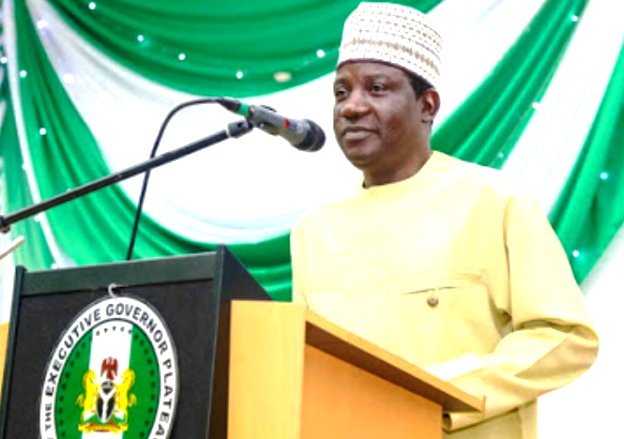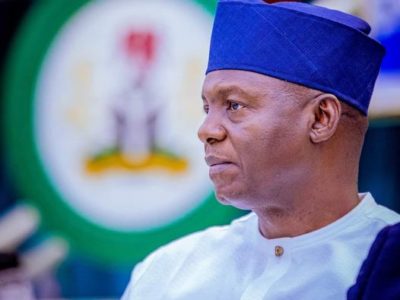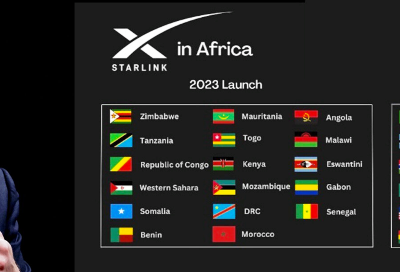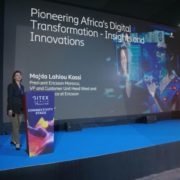Olusegun Oruame
Plateau State used to be known for its rocks, cold weather, intriguing low mountains and amity. In 2011, much of that went into smoke. There were riots, deaths and complete breakdown of law. Since then, the state has been struggling to win the peace.
Even when semblances of order returned, the consequences have remained. Business left and never returned.
But Governor Simon Bako Lalong is fostering a new vision of Plateau State as the new technology hub of Nigeria where entrepreneurs could leverage ICT to be active players in the new economy. Lalong envisages that a flourishing agriculture industry could be anchored like other sectors on a thriving ICT policy thrusts.
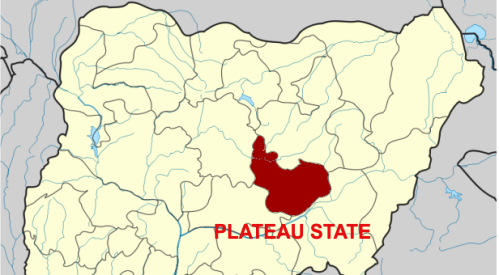
Lalong’s vision appears to be playing out thus: building and maintaining the peace; promoting businesses and entrepreneurship through the Plateau State Small and Medium Enterprise Agency; and remodeling the state economy on ICT through the Plateau State Information Communication and Technology Development Agency (PICTDA).
The game-plan of this vision appears to be playing out thus: building and maintaining the peace; promoting businesses and entrepreneurship through the Plateau State Small and Medium Enterprise Agency; and remodeling the state economy on ICT through the Plateau State Information Communication and Technology Development Agency (PICTDA).
To manage PICTDA, Lalong went for the young and ebullient Daser David as pioneer Director General (DG). For many who should know, the choice of David from the private sector reflects the government’s rising commitment to technology development as a way to alter for good, the narratives coming out of Plateau, and a desire to foster a new economy around ICT so that the state’s critical growth engine will be driven by young, dynamic citizens.
In drawing up PICTDA’s policy agenda, its designers considered modeling ICT growth alongside strides achieved by countries like Kenya and Rwanda. PICTDA is the anchor through which the Plateau state government intends to focus on developing an ICT-enabled state with a robust landscape for ICT, science, technology and innovation (STI).
David and other participants at the 2019 annual Facebook forum, Silicon Valley
Through PICTDA, Plateau plans to leverage ICT opportunities in innovation, education, and job creation; it also hopes to use the framework to addresses the myriad of social, economic and political challenges thrown up in the past decades since Jos erupted in flames.
“We seek a multi-stakeholders approach and we are open to talking to support think-tanks home and abroad that could offer ideas and strategies to achieve the policy thrust for which PICTDA was set up,” said David during meetings in Charlotte, North Carolina with some tech players on how to build the required skill that could tap opportunities in BPO outsourcing.
Earlier at the annual Facebook forum in California, David had told an audience from across the globe that while resource remains scarce and finance is a key challenge, the Plateau state government has remained convinced that ICT holds the ace to build a new and sustainable economy.
DAVID: “ICTs will cause disruptions in the traditional economic and social structures on the Plateau. Our objective at PICTDA is to encourage these disruptions, create new economic hub for digital activities, without eroding social with political cohesion of the state. ICT will create new jobs within the framework of the SDGs without necessarily leading to loss of jobs.”
“Over the years Africa has evolved from a third world country to a one stop shop for software engineering talents hunt. We have witnessed the migration of tech talents from Africa and most notably Nigeria to Europe and the US to fill up tech positions. What this means is that we keep losing the best of our developers in search of opportunities in the developed world. While this has been attributed to institutional failures in the Nigerian system and billions of dollars have been spent by the development communities like the World Bank in what is currently termed as “institutions reforms project”, that has so far produced muted results,” said David inside Silicon Valley during the Intel talk with conversation on ‘Silicon Plateau and Africa’s Quest for Prosperity.’
“The Nigerian government is currently adopting a market-creating innovation as a makeshift solution to creating prosperity and Silicon Plateau is one of such attempts of how we intend to create the market for keeping these developers and inspiring the next generation of engineers. The purpose of this talk is to uphold the institutional reform that Nigeria is already experiencing, the limitation that has made these reforms produce muted results and the new method of market creating innovation that is phasing in. Plateau state is no doubt going to be in the fore-front of this economy development strategy,” added David.
While the PICTDA is nested in Jos, it is working to develop state-wide clusters of innovation hubs as primary centres to discover talents and trainable hands. The deal is to work closely with local government councils so as to set up technology centres that could leverage the policy drive at the centre in Jos. One of such hubs is the Qua’an Pan Innovation hub targeting to attract hordes of youths in that axis and turn them to digital soldiers fit to play in the global digital economy.
“ICTs will cause disruptions in the traditional economic and social structures on the Plateau. Our objective at PICTDA is to encourage these disruptions, create new economic hub for digital activities, without eroding social with political cohesion of the state. ICT will create new jobs within the framework of the SDGs without necessarily leading to loss of jobs.
“We are looking at getting young people acquire new skills and helping to retool people with older careers to become more efficient and more functional whether in government or in private sector,” said David in Charlotte.
PICTDA is required to design and adopt ICT-centric strategies that could impact economic growth, employment opportunities, government policies with regulatory frameworks, education, and markets.
“All these need collaborations and constant stakeholders input,” added Daser.
In developing economies such as those of Kenya, Rwanda and increasingly Tanzania, the ICT sector is becoming a key driver of GDP growth. These economies are smaller in size compare to Nigeria’s. But in size, and topography, they offer a good model for how Plateau state could have a capsule approach to reworking its own economy to become a hub for ICT skills acquisition or advancement, as well as become Nigeria’s nerve for provision of technology solutions.
DAVID: “The purpose of this talk is to uphold the institutional reform that Nigeria is already experiencing, the limitation that has made these reforms produce muted results and the new method of market creating innovation that is phasing in. Plateau state is no doubt going to be in the fore-front of this economy development strategy.”
Because of its temperate weather, Plateau is the belt for Irish potato and cabbage or such other crops in Nigeria. The idea behind Silicon Plateau is to also have a technology belt right at the centre of Nigeria where ICT skills and solutions could be sourced at low and globally competitive rates,” said David.
He added: “We want to be seen as the tech skills, capabilities and solutions belt in Nigeria for local and global companies to drive businesses.”
The idea of modeling Plateau’s vision of ICT on Kenya and Rwanda is encapsulated in the Silicon Plateau; an initiative conceived round public/private partnership (PPP) with the private sector expected to play a major role.
PICTDA desires to deepen interaction between government and the private sector as well as other stakeholders within and outside the state. The agency, according to David, is anchoring the implementation of its policy thrusts through streams of support from private sector players to help navigate the complexity in technology value chain, whether as it concerns software development and coding; tech infrastructure deployment, technology business set-up and management or other niche areas.
DAVID: “The Nigerian government is currently adopting a market-creating innovation as a makeshift solution to creating prosperity and Silicon Plateau is one of such attempts of how we intend to create the market for keeping these developers and inspiring the next generation of engineers.”
For David and his team at PICTDA, Silicon Plateau may be considered to be an aggregation of Governor Lalong’s commitment to the new Plateau where peace with stability is made to nurture a technology value chain that produces new businesses, new careers, and a host of new possibilities.
It may not be too long for Plateau State to challenge our imagination once again on the beauty and boundlessness of creativity as was the case in the 70s and 80s before the riots came to town.
Visit Jos, experience Lalong’s new Plateau. Start from the PICTDA!


